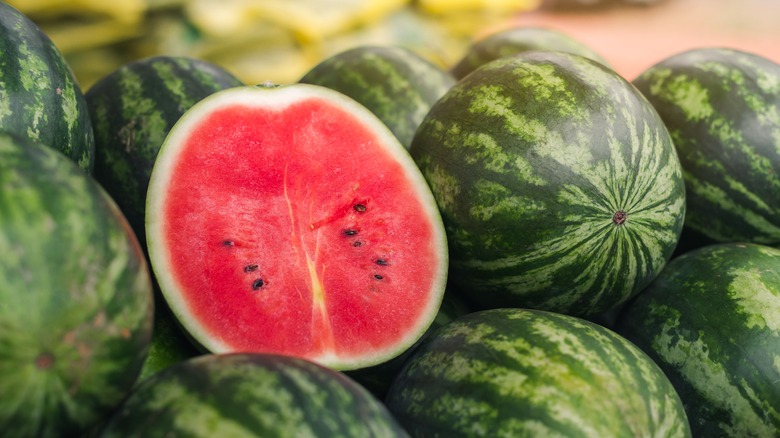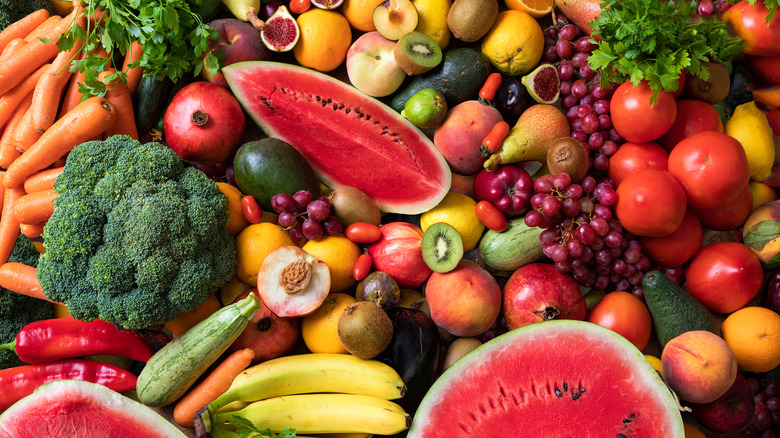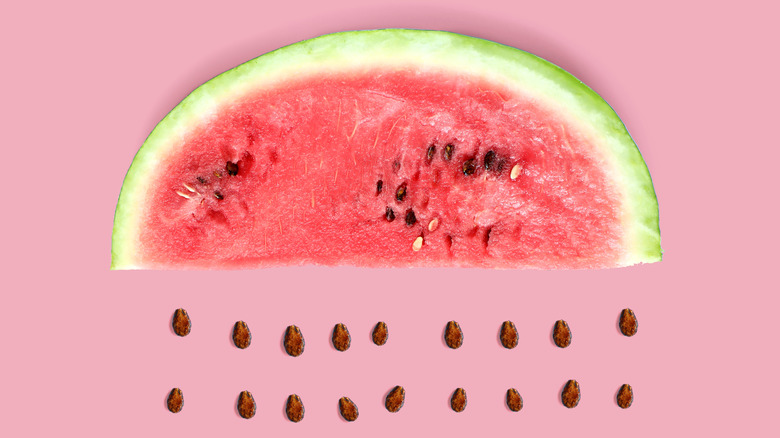12 Benefits Of Eating Watermelon
What's green on the outside, red on the inside, and is also the state vegetable of Oklahoma? That would be the watermelon.
As the watermelon is part of the cucumber family and grown using vegetable gardening techniques commonly applied to its relatives, like zucchini and squash, the good people of Oklahoma have decided to venerate the watermelon as a vegetable (via HuffPost). Whether you consider watermelon a fruit or a vegetable, there is no debating its popularity around the world, with approximately 200 million tons of it grown each year, per Kew Gardens.
According to the Washington University of St. Louis, the watermelon has its roots in Africa, where scientists believe it originated from the Kordofan melon from Sudan in the northeast of Africa. From there, it evolved into one of the healthiest and most beneficial foods available today.
The United States Department of Agriculture states that the average serving size (280 grams) of diced watermelon contains 92 calories, 0.4 grams of fat, 23 milligrams of vitamin C, 80 milligrams of vitamin A, and 256 grams of water. It is clear that watermelon is a nutrient-dense food that offers plenty of vitamins, fiber, minerals, and useful components for good health (via The National Watermelon Promotion Board). Keen to know more? Here are 12 benefits of eating watermelon.
1. Watermelon helps reduce muscle soreness after exercise
So, you've hit the gym and pushed yourself to the limit. You feel sweaty and accomplished, but then the muscle ache hits, and you can't stand or sit without letting out a groan of exertion. This is when watermelon can help.
By eating watermelon or drinking its juice, you can reduce muscle soreness that often comes on the heels of high-intensity exercise. This is because watermelon is a natural source of citrulline, an amino acid that has been shown to help with muscle aches after intense exercise (via WebMD). A study published by the Journal of Agricultural and Food Chemistry in 2013 showed that drinking watermelon juice before exercise reduces muscle aches and boosts the heart recovery rate in athletes.
So, when is the best time to eat your dose of watermelon to reduce muscle aches? In a 2020 review of several studies of the effects of citrulline on muscle soreness, the Journal of Sport and Health Science stated that consuming it an hour before intense physical activity provides the most benefits. Before your next football game or weightlifting session, you might want to load up on several slices of watermelon.
2. Watermelon keeps you hydrated
You've probably heard of the golden rule of drinking eight glasses of water a day. Most medical professionals have debunked this as a myth and nothing more, as every individual's water needs differ (via Scientific American).
However, proper hydration is still an important part of keeping healthy. It affects your body functions, and a lack of water may cause fatigue and illness, per Mayo Clinic. The good news is that you don't have to rely on drinking water to meet your hydration needs. Harvard Medical School states that any beverage with water content, as well as food high in moisture, such as leafy greens and fruits, can contribute toward your daily water needs.
Watermelon is one such water-rich food. It has a water content of 92% and provides a tasty source of hydration, per The National Watermelon Promotion Board. By consuming one serving of watermelon, you get the equivalent of more than one glass of water.
3. Eating watermelon can decrease the risk of cancer
Cancer is one of the world's most concerning diseases, with 18.1 million new cases diagnosed in 2020 (via World Cancer Research Fund). Cancer's physical symptoms, high treatment costs, and emotional stress take a toll on not only the patient but also their loved ones, providing plenty of reasons to work towards its prevention. Harvard Medical School lists several ways to increase cancer prevention, such as avoiding smoking, reducing alcohol intake, exercising regularly, and eating a balanced diet rich in fiber, fruits, and vegetables.
One facet of cancer prevention that has gained much attention in recent years is the research on diet and the effect it has on the disease. In particular, studies are being conducted on food with substances like vitamins and minerals that have protective properties against the disease, per the American Society of Clinical Oncology.
Watermelon is one of the richest sources of the antioxidant lycopene, which has been known to decrease the risk of cancer (via the Mayo Clinic). A study published by the National Library of Medicine in 2014 shows that lycopene provides protective benefits against cancer in several ways, including promoting the elimination of cancer-causing substances from the body, disrupting the reproduction of cancer cells, and preventing the development of certain cancer cells. Add more watermelon to your diet, and you can naturally help boost your body's protection against cancer.
4. Lower your blood pressure with watermelon
High blood pressure, or hypertension, is where the "force of blood pushing against blood vessel walls" is higher than normal (via WebMD). Medical News Today states that nearly 50% of the adult population in the U.S. suffers from high blood pressure and is at risk of developing health issues, like heart disease and stroke.
A list of factors can affect an individual's likelihood of developing high blood pressure, including genetic predisposition, age, lack of physical activity, race, diabetes, and pregnancy, per Healthline.
The main treatment for high blood pressure usually involves changes to lifestyle, such as incorporating regular exercise, consuming less alcohol, and eating more fruits, vegetables, and whole grains. However, you can also help lower your blood pressure by eating more watermelon. Research published by the National Library of Medicine shows that lycopene, the antioxidant found in watermelon, can lower blood pressure in both individuals with high blood pressure and those at risk of developing it.
Additionally, according to University Health News, studies have shown that watermelon can lower blood pressure thanks to its high levels of citrulline, which stimulates the production of nitric oxide in the body. This allows blood vessels to dilate and blood to flow more easily.
5. Eating watermelon helps protect you against sun damage
Wonder why cult-favorite skin care products from Glow Recipe contain watermelon extract as one of their key active ingredients? It's because watermelon is high in vitamin A, which (in both edible and topical applications) helps neutralize harmful free radicals that result from exposure to the sun (via Glow Recipe).
So, what exactly are free radicals and how do they affect your skin? When your skin is exposed to the UV radiation present in sunlight, free radicals are formed. According to L'Oreal Paris, free radicals are volatile atoms that can cause damage to your skin by targeting the lipids that help keep it hydrated. As a result of this damage, your skin becomes less elastic and loses its glow.
But it's not only the vitamin A in watermelon that helps protect your skin from sun damage. The mighty antioxidant lycopene has also been shown to protect skin from sun damage. Food and Nutrition Magazine cites a study where participants were given lycopene supplements before being exposed to UV light, causing a significant decrease in skin reddening as compared to the placebo group who did not receive lycopene. With its high amounts of the antioxidant, watermelon can help shield your skin from damage caused by the sun; however, it is still recommended that you apply SPF daily.
6. Increases collagen production for healthy skin
Collagen has long been used as an ingredient in the Asian beauty market, with brands proclaiming their products' efficiency in keeping your skin plump and youthful, per Elle. It is not difficult to see why, as collagen is a protein that plays an important role in the human body.
According to Medical News Today, "collagen forms a scaffold and structure within the body" and is vital in maintaining the skin's elasticity and strength. However, due to aging and other factors, such as smoking, alcohol consumption, and sun exposure, our body's production of collagen gradually slows down and causes our skin to wrinkle and dry out (via Healthline).
While consuming collagen-rich animal products, such as bone broth and fish skin, can replenish the body's collagen, per WebMD, eating watermelon can also increase collagen levels by stimulating your body's natural production of the protein. Watermelons are rich in vitamin C, which is an essential component needed for collagen production (via Healthline). Without this nutrient, the body is unable to synthesize its own collagen, affecting not only the health of your skin but also that of your hair and bones.
7. Watermelon can help prevent kidney stones
According to the National Kidney Foundation, pain in the lower back, stomach aches, bloody urine, and nausea are some of the symptoms of a kidney stone. As you can tell, kidney stones can be a painful experience. They are caused when minerals in the urine crystallize to form small stones in the kidney and cause severe discomfort until they are passed out of the bladder, per Mayo Clinic. In some cases, surgery may even be required to remove a kidney stone. The good news is that eating watermelon may help prevent kidney stones.
In a 2018 study published in Biomedicine and Pharmacotherapy, it was noted that when Wistar rats were fed watermelon extract, excess amounts of minerals in their urine decreased and the crystallization of calcium and oxalate in their urine was reduced. This is important, as calcium oxalate formations make up the most frequent cases of kidney stones.
Additionally, dehydration can result in these stones because the low water content in urine may cause a saturation of minerals, which encourages them to crystallize into stones, per the Urology Care Foundation. Watermelon's high water content helps with maintaining the body's hydration, which in turn can help in preventing kidney stones. Up your hydration even more by combining watermelon with cucumbers, which boast a whopping 95% water content (via Healthline).
8. Reduce arthritis by eating watermelon
The Centers for Disease Control and Prevention (CDC) states that arthritis presents as an inflammatory reaction in the body's joints, such as the knee or elbow, and the term is used to describe more than 100 disorders. Arthritis is one of the biggest sources of pain and physical impairment around the globe, per Mayo Clinic.
According to the Arthritis Foundation, watermelon is one of the best fruits to eat to help manage arthritis, as it has anti-inflammatory properties that help reduce the pain caused by swelling of the joints. This is evidenced in a study on lycopene published by the Journal of Cellular and Molecular Medicine in 2021. The report states that the antioxidant may help in controlling excessive production of proteins that cause inflammation in the body, and proposes a link between lycopene consumption and a reduction in the progression of osteoarthritis.
Additionally, watermelon also contains the carotenoid beta-cryptoxanthin. Studies, like this one published in the Biological and Pharmaceutical Bulletin in 2017, suggest that beta-cryptoxanthin can help prevent two types of arthritis — rheumatoid arthritis and osteoarthritis.
Want more foods that can help with arthritis? Try this recipe for grilled watermelon steaks with walnut gremolata. Not only is this recipe unique and delicious, but walnuts have also been shown to reduce inflammation that may cause arthritis.
9. Watermelon helps with weight loss
Each of our bodies is different, and there are personal lifestyle changes that can be made to decrease the risk or progression of certain health conditions. For example, WebMD explains that a doctor may advise you to try to lose weight to lower the risks or stop the development of heart disease, cancer, high blood pressure, diabetes, and arthritis. The good news is that not only does watermelon have positive effects on most of these conditions themselves, but it can also aid in weight loss, which can help prevent them from occurring.
To reap the health benefits, try incorporating watermelon into your meals or eat it as a snack. With its high water content and low amount of calories and fat, the fruit allows you to feel fuller while providing high nutritional value, per the National Watermelon Promotion Board. The natural sugars in watermelon also make it the perfect choice to help sate cravings for sweet foods without causing a spike in your blood sugar (via Today).
But don't just eat the red flesh of the watermelon. According to a study published in Current Developments in Nutrition in 2021, juice made by blending the rind and flesh of watermelon has been shown to reduce hunger for longer periods.
10. Eatng watermelon keeps the eyes healthy
Do you feel that things looked brighter and clearer when you were younger? Well, that's not just you growing jaded as you get older. WebMD explains that as we age, the macula, or the center of the retina covering the back of your eye, starts to get damaged, which causes difficulty in seeing shapes, colors, and details clearly.
To prevent or slow down damage to the macula, you can make several changes to your lifestyle. Quitting smoking, wearing sunglasses, and incorporating foods high in antioxidants and other nutrients — like watermelon — are some of the ways you can prevent macular degeneration (via the CDC).
As Sight Matters explains, watermelon contains many of the nutrients, such as vitamins A and C and zinc, that are required to keep your eyes healthy and prevent damage to the macula. Lycopene in watermelon has also been linked to keeping the eyes healthy. This can be seen in studies, such as one published in EXCLI Journal in 2014, which states that patients with a higher risk of developing macular degenerative disease were found to have lower lycopene levels.
With these benefits, watermelon can play a key role in keeping your eyes healthy. So grab a slice, and enjoy your favorite books, shows, and art well into your twilight years.
11. Boost your immune system by eating watermelon
When eating watermelon, it's often only the sweet, red pulp of the fruit that we seek out, while we discard the rind and seeds. Seed-spitting competition anyone?
However, it is not only the flesh of the watermelon that provides health benefits. The green peel and the seeds of the watermelon have powerful antimicrobial properties.
A 2021 study shows that while all parts of the watermelon show some form of antimicrobial effect, the peel and seeds provide the most defense against a variety of microbes, such as Salmonella, Staphylococcus aureus, and Enterococcus faecalis, per Scientific African. These microbes can cause foodborne illnesses, bacterial skin infections, and urinary tract infections (via Healthline), but they are no match for the powers of the watermelon peel and seeds.
To get the most benefits out of your watermelon, you can add the rind and seeds to a smoothie, or roast them for a crunchy, healthy snack. You can also buy watermelon seed butter to save yourself the trouble of picking out the seeds from your melon.
12. Watermelon improves digestion
According to John Hopkins Medicine, constipation is the most prevalent cause of discomfort that affects the digestive system. The condition sends 2.5 million people on a trip to the doctor every year, and over 4 million Americans are afflicted with recurring constipation.
Diet-related causes are some of the most common reasons for constipation, and typically involve a lack of water and fiber that keep the gut healthy. Drinking plenty of water each day not only keeps you hydrated but is also necessary for proper digestion (via Harvard T.H. Chan School of Public Health). Fiber is also an important component of keeping things regular; however, according to Harvard Medical School, the average American gets less than half the recommended daily amount.
Fortunately, watermelon provides a double dose of properties to help aid digestion. In this two-for-one deal, the fruit's high water content and fiber can keep you out of the doctor's office by helping prevent constipation.












